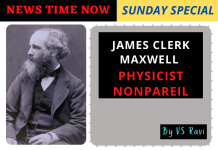There are a few anecdotes, real as well as apocryphal which because they are tinged with humour and also because they are told and retold by successive generations have acquired some sanctity and have been a perpetual source of delight. Though such anecdotes are there in every intellectual discipline or sport, or other fields, I am confining my discussion to only those which have become part of the folklore of science.
It would not come as a surprise to the reader that I am beginning this essay with Einstein, the greatest physicist of the 20th century.
When Einstein was offered a post at the Institute of Advanced Study, Princeton, in 1933, the idea was that Einstein would be able to spend seven months a year in Berlin, and five months at Princeton When taking up. his new assignment Einstein was asked what he would require for his research. He replied that he would require a notebook, a pencil and a large wastebasket to hold all of his mistakes”
And this from a man who discovered Relativity , and wrote down the most famous Equation that revolutionised Physics.
Einstein was once traveling on a train from Princeton. As in all trains, the ticket conductor came down the aisle, checking and punching the tickets all passengers. When he came to Einstein, the great man put his hand , in his vest pocket. Not finding his ticket, he reached for it in his trouser pockets. As it wasn’t there, he opened his briefcase but couldn’t find it there also. Then he frantically looked in the seat next to him. He still couldn’t find it.
The conductor who was watching this whole sequence of events, with amusement , said, “Dr. Einstein, don’t bother to look for your ticket- everyone inside this train including me knows who you are.. I’m sure you bought a ticket”
Einstein nodded gratefully. The conductor continued down the aisle punching tickets. When he was ready to move to the next car, he turned around and saw the great scientist down on his hands and knees looking under his seat, and the seat next to him, frantically, searching for his ticket.
The conductor rushed back and said, “Dr. Einstein, Dr. Einstein, don’t worry. As I told you, the whole Princeton knows who you are. I am sure you bought a ticket No problem. You don’t have to look for your ticket”
Einstein looked at him and said, “Young man, I too, know who I am. What I don’t know is where I’m going.! “
One day when Einstein was going back to his home in Princeton in a cab he forgot his home address. This particular cab driver did not recognise him. Einstein asked the driver if he knew Einstein’s home. The driver said “Who does not know Einstein’s address? Everyone in Princeton knows. Do you want to meet him?” Einstein replied “I am Einstein. I forgot my home address, can you take me there? “The driver took him home and did not even collect the fare from him
Once when Einstein was in Hollywood on a visit Charlie Chaplin, the great comedian drove him through the town. As the people on the sidewalks recognised two great though very different , contemporaries, they gave them a tremendous reception which astonished Einstein. “They’re cheering us both,” said Charlie Chaplin: “you because nobody understands you, and me because everybody understands me”
In Charlie Chaplin ‘s remark there was good-humoured pride , mixed with a certain humility – a recognition of the difference between his own ready popularity as a comedian and Einstein’s lasting greatness as a scientist of renown.
A fifteen-year-old school girl in Princeton once wrote a letter for seeking his assistance on a homework assignment in mathematics; Einstein sent his reply along with a page full of diagrams to the girl.With characteristic humility he wrote
“Do not worry about your finding problems in mathematics difficult ; I can assure you that mine are much greater.”. What humility !
There is also another anecdote concerning Einstein and a schoolboy who lived Ina house at the end of the street in which Einstein’s house was situated. Apparently the boy’s parents were quite puzzled to find that the boy had always finished his homework in Science before reaching home. They asked him how he had been able to do this. The boy reportedly replied that just before reaching home, he had been consulting ” an old man” in a house in the end of the street, and he had been helping him to finish his homework. ! That old man was no doubt Albert Einstein.
Once after having fully recovered from an illness , Einstein resumed international visits. On one occasion , Albert Einstein’s wife advised him to dress more professionally . He headed off to work. saying ” why should I? Everyone knows me there.” When the time came for Einstein to attend his first major Conference, she begged him again to dress up a bit. “Why should I?” said Einstein. “No one knows me there!” What utter simplicity!
Once a reporter asked Einstein to explain Relativity in a fesimple words understandable to laymen. : He replied ” When a man sits with a pretty girl for an hour, it seems like a minute. But let him sit on a hot stove for a minute— it’s longer than an hour. That’s relativity.”
My next set of anecdotes concerns Wolfgang Pauli , the Italian physicist who got the Nobel Prize for discovering the” Exclusion principle” and the so called ” Pauli effect”
According to Pauli’s “Exclusion principle”, no two electrons in an atom can be at the same time in the same state or configuration.
The so called ” Pauli effect” has no connection with the “Pauli exclusion principle” referred to above – the latter is a bonafide physical phenomenon to explain which an equation was derived by Pauli.
On the other hand , the ” Pauli effect” is now being humorously referred to as a ” Second Pauli exclusion principle” , according to which a functioning Scientific experimental device and Wolfgang Pauli may not occupy the same room, without the experiment failing. It would appear that Pauli himself was convinced that the effect named after him was real. He corresponded with Hans Bender a person doing research on Parapsychology and Carl Jung the Swiss psychoanalyst and psychiatrist who were inclined to view the effect as an example of the rather nebulous concept of synchronicity- the simultaneous occurrence of events which appear significantly related but have no discernible causal connection. It is rather ironical that Pauli the great theorist was corresponding with these two men, dabbling in unscientific theories about an inexplicable phenomenon like synchronicity, which is outside the realm of theoretical physics.
There is absolutely no theoretical scientific explanation for the Pauli effect which is the supposed tendency of Scientific equipment to encounter critical failure in the presence of certain people like Pauli . There was however experimental data in the form of anecdotal stories of numerous instances in which experimental equipment suffered technical problems only when Pauli was present.
The work of Physics research, since the 20th century has been divided between theorists and experimentalists, as the field of medicine is divided between physicians and surgeons. Physicians in general believe that surgeons requires lesser intellectual ability, in as much as their work requires only a mechanical surgical skill and no great understanding of the human physiological system. By the same token Surgeons feel that ultimately, it is their surgical skill that cures a patients (in most cases) . It would however appear that balance of the equation lies in favour of the physicians (in research in physics there are exceptions like Enrico Fermi who have been successful in both roles) . As theorists lack an aptitude or interest in experimental work, many of them have earned a reputation for accidentally , or even purposely breaking experimental equipment .In Pauli’s case it was postulated that he was SUCH A GOOD THEORIST that any experiments would be compromised by virtue of his presence in the vicinity . The great theoretical physicist Gamow claimed in his book “Thirty Years That Shook Physics” that the more talented the theoretical physicist, the stronger the Pauli effect.
Thus for example, out of fear of the Pauli effect, the experimental physicist Otto Stern banned Pauli from his laboratory located in Hamburg despite their friendship.
Some puzzling phenomena could not be explained away even by Pauli without invoking the Pauli effect !
Jung and Pauli saw some parallels between physics and depth psychology . Pauli was among the honored guests at the foundation festivities of the C.G. Jung Institute in Zürich 1948. Pauli’s entry had a remarkable effect at the ceremony— a China flower vase fell on the floor without any obvious reason—causing Pauli himself to write his article “Background-Physics”, in which he tries to find complementary relationships between physics and depth psychology.
A similar incident occurred in the physics laboratory at the University Of Göttingen. For no apparent reason, an expensive measuring device, suddenly stopped working, although Pauli was in fact absent. James Franck director of the institute, reported the incident to his colleague in Zürich with the humorous remark that at least this time Pauli was innocent. He was not. It turned out that Pauli had been on a railway journey to Copenhagen and had switched trains in the Göttingen rail station at about the time the incident took place.
R. Peierls describes a case when at one reception this effect was to be parodied by deliberately crashing a chandelier upon Pauli’s entrance. The chandelier was suspended on a rope to be released, but it stuck instead, thus becoming a real example of the Pauli effect, though unintended by the organisers!
In February 1950, when Pauli was at Princeton University, the Cyclotron burnt and he asked himself if this mischief belonged to such a Pauli effect, named after him.
Thus Pauli , one of the greatest theoretical Physicists, was himself puzzled by these occurrences which he was unable to explain by finding an equation or a physical law and had to reluctantly concede that there was in fact such a phenomenon which did in fact occur if a physicist performed an experiment in Pauli’s presence or even in his vicinity.
Is the Pauli Effect real, asks Paul Harpen, physicist and science writer. Author of Synchronicity: The Epic Quest to Understand the Quantum Nature of Cause and Effect?
Anecdotal evidence aside, certainly not. The human brain has a propensity to look for patterns, even when a series of occurrences might statistically be attributed to mere coincidence. Moreover, often genuine patterns that seem mysterious have scientific explanation in a common cause.
Therefore we might attribute the effect to a real common cause (genuine absentmindedness and clumsiness) mixed with the keen desire by Pauli and others to look for patterns amongst the noise. Yet the Pauli Effect is certainly great fun to talk about, lending humor to the serious topic of theoretical physics.
Another anecdote concerns Neils Bohr, the famous , atomic scientist who won a Nobel Prize. A friend was visiting his home.
As they were talking, the friend kept glancing at a horseshoe hanging over the door. Finally, unable to contain his curiosity any longer, he demanded:
“Niels, it can’t possibly be that you, a brilliant scientist, believe that foolish horseshoe superstition! ? !”
“Of course not,” replied the scientist. “But I understand it’s lucky whether you believe in it or not.


















































